
 I wanted to get this lookback feature in, before reading any accounts of the Pentecost prayer vigil led today by Pope Francis to avoid any appearance of 'comparing' two events, but I suppose that is inevitable. Anyway, enjoy this lookback to seven years ago...
I wanted to get this lookback feature in, before reading any accounts of the Pentecost prayer vigil led today by Pope Francis to avoid any appearance of 'comparing' two events, but I suppose that is inevitable. Anyway, enjoy this lookback to seven years ago...
350,000 at Pentecost rally
and prayer vigil with Benedict XVI

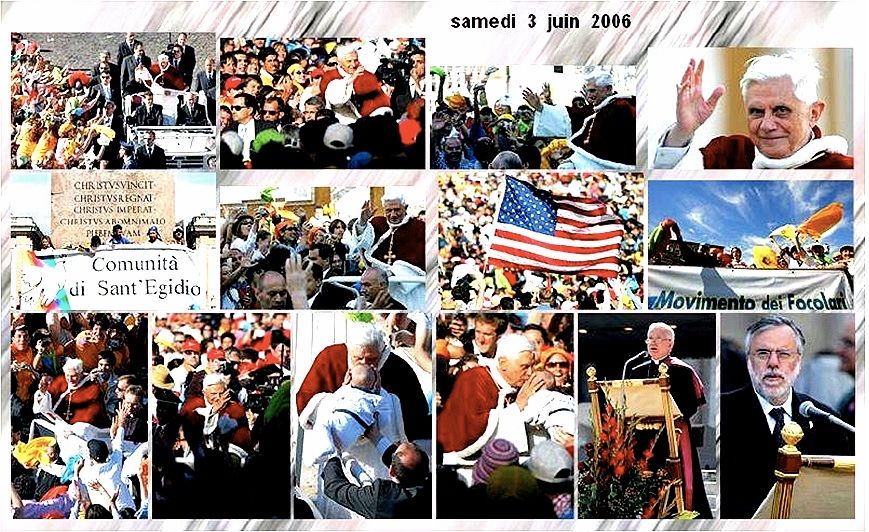 VATICAN CITY, June 3, 2006 (AP) - Pope Benedict XVI joined a cheering crowd of 350,000 people overflowing from St. Peter's Square for a Saturday evening rally aimed at boosting faith and encouraging efforts to spread the Roman Catholic Church's message throughout the world.
VATICAN CITY, June 3, 2006 (AP) - Pope Benedict XVI joined a cheering crowd of 350,000 people overflowing from St. Peter's Square for a Saturday evening rally aimed at boosting faith and encouraging efforts to spread the Roman Catholic Church's message throughout the world.
Participants, many of them young people, began arriving in early morning to gain a place in the square. Some of them strummed guitars and sang to pass the hours while waiting for the Pope to appear.
]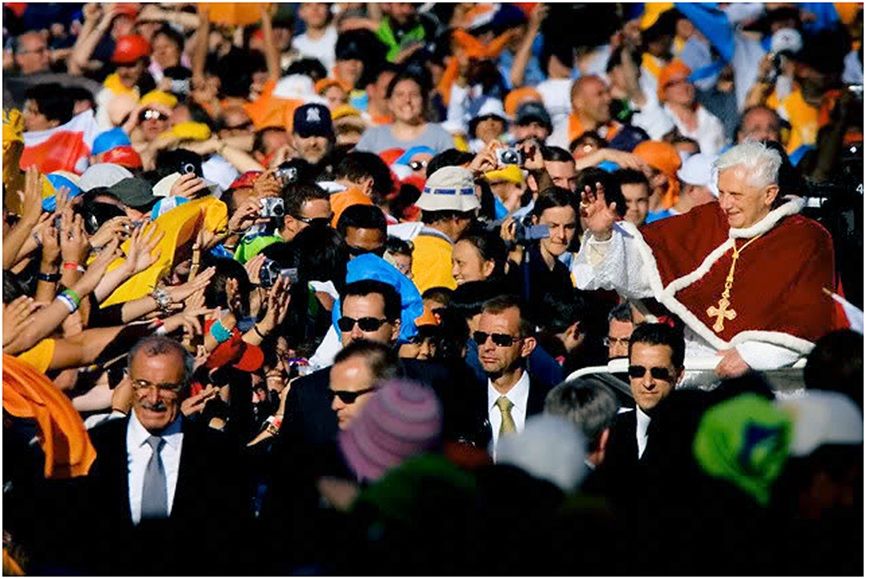
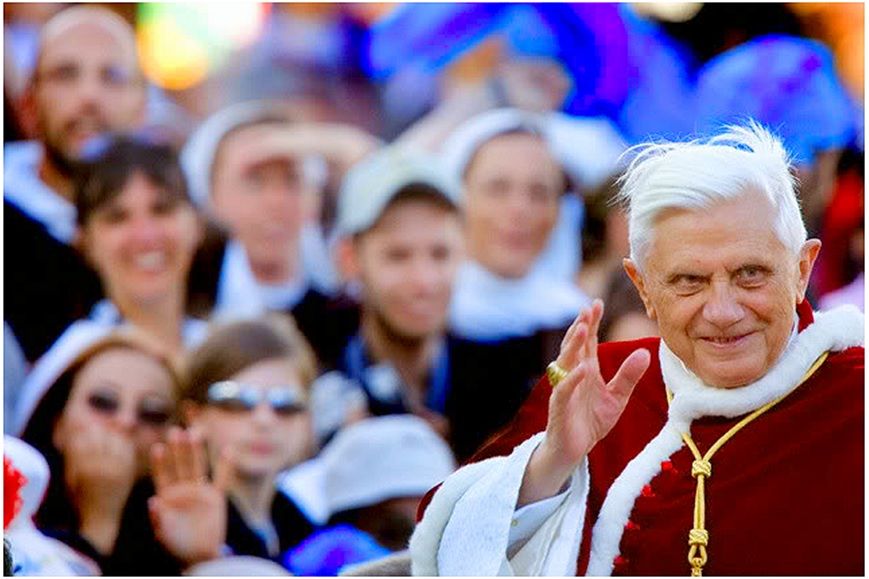
Benedict, wearing a fur-trimmed crimson cape against a chilly breeze, waved to the faithful from the popemobile, as he was driven toward the steps of St. Peter's Basilica.
More than 100 religious groups were represented. The Rome police prefecture's office, which coordinates security in Rome, estimated the crowd at 350,000 people at the start of the rally.
The crowd stretched down the boulevard leading to the Tiber River.
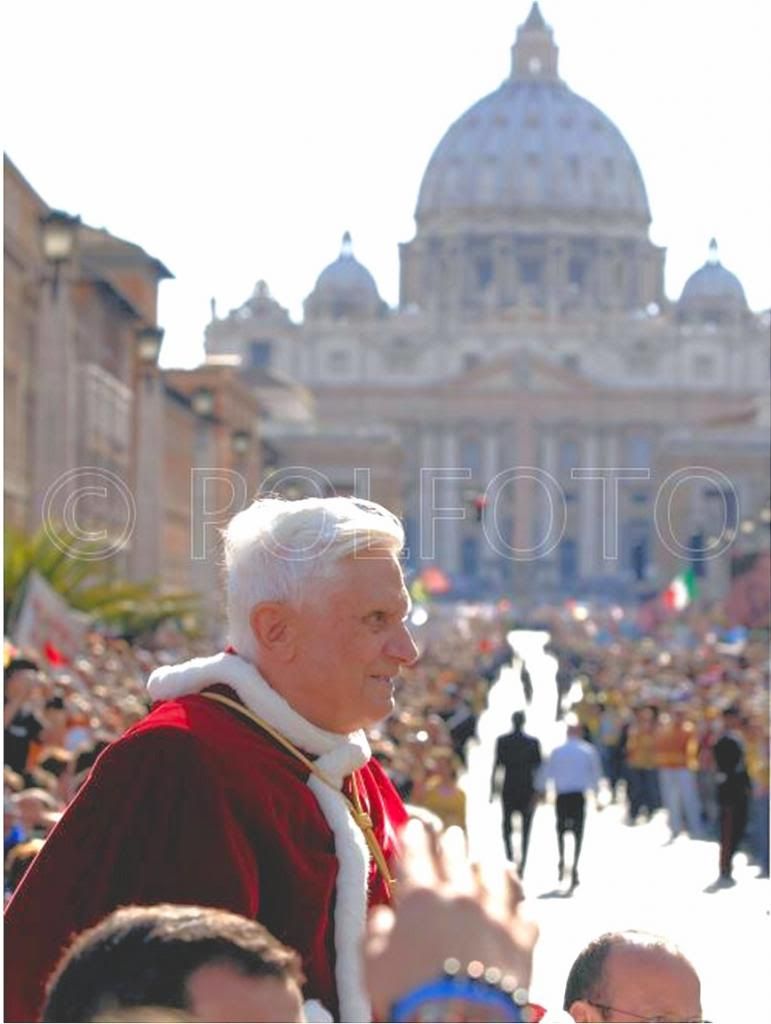
On the eve of Pentecost,
Benedict XVI leads Vespers
with new ecclesial movements
Translated from

June 3, 2006
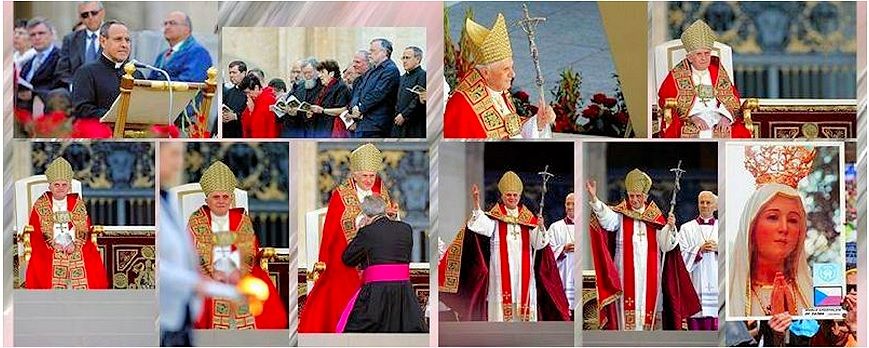
At 5:30 p.m. today, the Holy Father met more than 350,000 representatives of Church movements and new communities at St. Peter’s Square.
After a tribute from the President of the Pontifical Council for the Laity, Mons. Stanislaw Rylko, and the reading of a message from Chiara Lubich, founder of the Works of Mary (Focolari movement), the Vespers for the eve of Pentecost were celebrated.
The reading of each of three Psalms was followed by a ‘reflection’ by Andrea Riccardi, founder of the Community of St. Egidio; Kiko Arguello, founder of the Neo-Catechumenal Way; and Mons. Julian Carron, president of the Brotherhood of Communion and Liberation.
After the brief Reading, the Pope gave the following homily. Here is a translation:
Dear brothers and sisters!
You have arrived in truly great numbers this afternoon at St. Peter’s Square to participate in the Pentecost Vigil. Belonging to divergent nations and cultures, you who are here represent all the members of church movements and new communities gathered spiritually around the Successor of Peter to proclaim the joy of believing in Jesus Christ and to renew the commitment to be His faithful disciples in our time. I thank you for your participation, and I address a cordial greeting to each one of you.
My affectionate thoughts go first of all to the Cardinals, to my venerated brothers in the Episcopate and priesthood, and to all the religious men and women. I greet the officials of your numerous ecclesiastical entities which demonstrate the living action of the Holy Spirit on the people of God.
I salute those who have prepared this extraordinary event, particularly those who work in the Pontifical Council for the Laity, with its Secretary, Mons. Josef Clemens, and its President, Mons. Rylko, whom I also thank for the cordial sentiments expressed towards me at the start of Vespers.
A similar encounter comes to mind which took place in this same Piazza on May 31, 1998, with the beloved John Paul II. Great evangelist of our time, he accompanied and guided you during his entire pontificate.
Many times he called your associations and communities ‘providential’, especially because the sanctifying Spirit works through you to reawaken the faith in the heart of many Christians and make them rediscover the vocation they received at Baptism, helping them to be witnesses of hope, full of that fire of love which is precisely the gift of the Holy Spirit.
Now we ask ourselves: Who or what is the Holy Spirit? How do we recognize Him? In what way do we go toward Him and He to us? One first answer is given by the great Pentecostal hymn of the Church, Veni creator Spiritus, "Come Spirit of Creation”. The hymn refers to the first passages of the Bible which express through images the creation of the universe. Above all, it says that the Spirit of God hovered over the chaos, over the waters of the abyss.
The world in which we live is the work of the Spirit of Creation. Pentecost is not only the beginning of the Church, and therefore, in a special way, its feast; Pentecost is also the feast of creation. The world does not exist by itself; it came from the creative Spirit of God. And therefore it also mirrors the wisdom of God. That wisdom, in its breadth and in the all-comprehensive logic of its laws, allows us to glimpse something of the Creative Spirit of God. It calls forth our reverential awe.
It is precisely he who, as a Christian, believes in the Creative Spirit, must realize that we cannot use and abuse the world and its resources simply as materials do with as we please; that we should consider creation as a gift entrusted to us, not to be destroyed, but so that it becomes the garden of God and therefore a garden of men.
Faced with the multiple forms of abuse of the earth that we see today, we can almost hear the groan of creation that St. Paul wrote about (Rm 8, 22). We begin to understand the words of the Apostle, that creation impatiently awaits the children of God in order to be set free and to reach its splendor.
Dear friends, we wish to be the children of God whom creation awaits, and we can be so because in Baptism, the Lord has made us so. Yes, both creation and history await us, await men and women who are truly children of God and act accordingly.
If we look at history, we see how around monasteries, creation (nature) has been able to prosper, as though with the installation of the Spirit of God in the hearts of men, the splendor of the Creative Spirit has infused the earth itself – a splendor which the barbarities of human thirst for power have obscured and sometimes even almost completely extinguished.
Around Francis of Assisi, the same thing happened. It happens wherever the Spirit of God comes into men’s souls, this Spirit which our hymn describes as light, love and energy. Thus we have a first answer to the question, what is the Holy Spirit, what does He do and how do we recognize Him? He comes to us through creation.
Nevertheless, God’s good creation, in the course of human history, has been covered over by a massive layer of filth which makes it – if not impossible – at least difficult to recognize in it the reflection of the Creator. Although a sunset at sea, or an excursion in the mountains, or a flower that opens, reawakens in us, almost spontaneously, a consciousness of the existence of the Creator.
But the Spirit of Creation comes to our aid. He has entered into history and speaks to us in a new way. In Jesus Christ, God himself became man and has allowed us, so to speak, to look intimately at God himself. And there we see something totally unexpected: In God there exists an I and a You. Far remote from a mysterious God, God is not an infinite solitude, He is an event of love.
If by looking at creation we can see the Spirit of Creation, God Himself, almost like creative mathematics, as a power who makes the laws of the world and brings order, and afterwards, also as beauty, then we come to know this: the Spirit of Creation has a heart. He is Love.
The Son exists who talks to the Father. And both are one together in the Spirit, which is, in a manner of speaking, the climate of loving and giving which makes of them the one God. This unity of love, which is God, is a unity that is much more sublime than the unity of the simplest indivisible particle there is. The triune God is the one God.
Through Jesus, we have said, we are able to have a glimpse at the intimacy of God. John in his Gospel expressed it this way: “No one has ever seen God; but his only Son, who is in the bosom of the Father, has revealed Him (to us) (Jn 1,18). But Jesus did not just allow us to look into the intimacy of God; with Him, God emerged from his intimacy and came to us. This is what happens in his life, passion, death and resurrection, in His words.
Jesus was not content to simply come to us. He wanted more. He wanted unification. This is the significance of the images of the banquet and the wedding. We should not only know something about Him, but through Him we should be drawn to God. For this, he had to die and resurrect. Now, he is no longer found in a specific place, but his Spirit, the Holy Spirit, emanates from Him and enters our hearts, thus conjoining us with Jesus Himself and with the Father – with the one and Triune God.
This is Pentecost: Jesus, and through Him, God himself, comes to us and draws us towards Him. “He sends the Holy Spirit,” – so Scripture says. What was the effect? Above all, I would like to stress two aspects: the Holy Spirit, through whom God comes to us, brings us life and liberty. Let us look at both things closely.
“I have come so that they may have life and may have It in abundance,” Jesus says in the Gospel of John (10,10). Life and liberty – they are the things that all of us want. But what is it – where and how do we find “life”?
I think that, spontaneously, the greater majority of men have the same concept of life as the prodigal son in the Gospel. He had asked for his share of the inheritance, and now he felt free, and he wanted to live without the weight of any duties at home. He only wanted to live – to get from life all that it had to offer. To enjoy it fully. To live it up, drink fully of life and not miss anything of worth that it could offer. In the end, he found himself a mere swineherd – envying those very animals, so empty had his life become, so in vain. Even his freedom proved to be in vain.
Isn’t the same thing happening these days? When one wants nothing better in life than to be master of it, then life becomes emptier, poorer. It becomes easier then to find refuge in drugs, in grand illusions. And then doubt emerges whether living , after all is said and done, is truly a gift at all. So no, we do not find life this way.
Jesus’s words on life in abundance is found in His discourse on the Good Shepherd. They are words that have a double context. About the shepherd, Jesus says he gives his own life (for his flock).
“No one takes away my life, but I offer it myself.” (cfr Jn 10,18). Life is found only by giving it; it is not found by wanting to possess it. This is what we should learn from Christ; this is what we are taught by the Holy Spirit, who is pure giving, God giving Himself. The more one offers his life for others, for good itself, the more abundantly will the river of life flow.
In the second place, the discourse tells us that life blossoms in walking together with the Shepherd who knows the pasture – the places where the springs of life arise. We find life in communion with Him who is life Himself – in communion with the living God, a communion to which we are introduced by the Holy Spirit, whom the hymn calls fons vivus, living fountain.
The pasture in which the springs of life flow is the word of God as we find it in the Scriptures, in the faith of the Church. The pasture is God himself who, in the communion of faith, we come to know through the power of the Holy Spirit.
Dear friends, your movements were born precisely out of a thirst for true life; they are movements for life in every aspect. Where the true spring of life no longer flows, whenever one only appropriates life instead of giving it, then even the lives of others are endangered. Because then, one is disposed to exclude defenseless life, life which is yet unborn, because it seems to reduce the space of one’s life.
If we want to protect life, then we must rediscover the spring of life; then life itself will emerge in all its beauty and sublimeness. And so, we must let ourselves be revived by the Holy Spirit, the creative source of life.
I already stressed the subject of freedom earlier. The themes of life and liberty are linked in the story of the prodigal son. He wanted to live and therefore he wanted to be completely free. To be free, in this view, is to do as one pleases – not to have to accept any criteria other than from oneself. To follow only my desire and my will. Who lives that way will soon encounter someone else who wishes to live the same way. The necessary consequence of such a selfish view of freedom is violence, the reciprocal destruction of both liberty and life.
Instead, Sacred Scripture links the concept of liberty with that of filiality: ”You have not received the spirit of slavery to fall back in fear, but you have received the spirit of adopted sons through which we can cry, 'Abba! Father!’” (Rm 8.15). What does this mean?
St. Paul assumes here the social system of the ancient world, in which there were slaves who possessed nothing and therefore had no interest however things turned out. In contrast, there were the sons, who were also heirs, and therefore were concerned with the preservation and good administration of their properties or the preservation of the State. But because they were free, these sons, they also had responsibilities.
Leaving aside the sociological background of that time, the principle is always valid: freedom and responsibility go together. True freedom is demonstrated through responsibility, in a manner of behavior that takes co-responsibility for the world, for oneself and for others. Free is the son to whom something belongs that he will not allow to be destroyed. All the worldly responsibilities of which we speak are however, partial responsibilities, for a specific environment, for a specific State, etc.
But the Holy Spirit makes us sons and daughters of God. He involves us in God’s own responsibility for His world, for all of humanity. He teaches us to look at the world, at others and at ourselves with the eyes of God. We do good not as slaves who are not free to do otherwise, but we do good because we personally bear responsibility for the whole, because we love truth and goodness, because we love God himself and therefore even His creatures.
This is the true freedom to which the Holy Spirit wants to lead us. The church movements wish to be and should be schools of freedom, of this true freedom. In such schools we want to learn true freedom, not that of slaves who aim to cut a piece of the cake for themselves even if this will mean that others will not have a share. We want genuine freedom, that of heirs, the freedom of the children of God.
In this world, so full of fictitious freedoms that destroy the environment and man himself, we wish, with the power of the Holy Spirit, to learn together what true freedom is; to construct schools of freedom; to show others with our life that we are free, and how beautiful it is to be genuinely free in the freedom of the children of God.
The Holy Spirit, in granting life and liberty, also gives us unity. These are three gifts which are inseparable. I have already spoken too long. But allow me to say a word on unity. To understand it, there is a phrase which may be useful but at first hearing, it may seem rather to distance us from it.
To Nicodemus, who in his search for truth, came by night with his questions to Jesus, He said: ”The Spirit breathes where it will” (Jn 3,8). But the will of the Spirit is not arbitrary (capricious). It is the will to truth and to goodness. Therefore it does not breathe just anywhere, turning this way now, and that way next. His breath is not squandered; it unites us, because truth unites, love unites.
The Holy Spirit is the Spirit of Jesus Christ, the Spirit which unites the Father with the Son in the Love which gives and welcomes, in the one God. The Spirit unites us in such a way that St. Paul could say at one point: “You are one in Christ Jesus” (Gal 3,28). The Spirit, with His breath, impels us towards Christ. And the Holy Spirit operates corporally, not just subjectively or ‘spiritually.’
To the disciples who thought He was only a ‘spirit’, the Risen Christ said: “It is really me! Touch me and look: a simple spirit – a ghost – does not have flesh and bone like you see I have” (cfr Lk 24,39). This is true of the Risen Christ in every epoch of history. He is not just a ghost, not simply a spirit, a thought or an idea. He remains the Incarnate One – who took on our flesh – and continues always to edify His body, makes of us His body.
The Spirit breathes where it will, and his will is unity made incarnate, the unity which encounters the world and transforms it.
In the Letter to the Ephesians, St.Paul tells us that this Body of Christ, which is the Church, has ligaments, and he identifies them: the apostles, prophets, evangelists, pastors and teachers (cfr 4,12). The Spirit in His gifts is multiform – we see it. If we look at history, if we look at this assembly here in St. Peter’s Square, then we realize how He always calls forth new gifts; we see the diversity of organs which He creates and how, always anew, He works corporally. Yet in Him, multiplicity and unity go together.
He breathes where He will. He does so in unexpected ways, in unexpected places, and in previously unimagined ways. And with what multiplicity and corporality He does so! And it is precisely here that multiplicity and unity are inseparable. He wants your multiformity and he wants you for the only Body, in union with its durable orders – the ligaments of the Church - with the successors of the apostles, and the Successor of Peter.
He doesn’t spare us the effort of learning how to relate to each other reciprocally; but He shows us that He works in view of the one body and in the unity of that one body. It is only that way through which this unity can acquire its strength and its beauty. So take part in the edification of the one body! The ministers will watch that the Spirit is not extinguished (cfr 1 Thes 5, 19) and you will not cease to bring your gifts to the entire community.
Once again: the Spirit breathes where it will. But his will is unity. He leads us to Christ, to His body. "From Christ,” St. Paul tells us, “the whole body, joined and held together by every supporting ligament, with the proper functioning of each part, brings about the body's growth and builds itself up in love.” (Eph 4, 16).
The Holy Spirit wants unity, wants totality. Therefore His presence is demonstrated above all even in the missionary drive. Whoever has encountered something of the true, the good and the beautiful in his own life - the only genuine treasure, the precious pearl – runs to share it everywhere, with his family and at work, in all the spheres of his existence.
He does so without any fear, because he knows he has been adopted as a son of God; without any presumption, because everything is a gift; without discouragement, because the Spirit of God precedes his action in the hearts of men, and like a seed in the most diverse of cultures and religions. He does so without frontiers, because he bears good news that is meant for all men and for all peoples.
Dear friends, I ask you to be – even more, so much more – than collaborators in the universal apostolic ministry of the Pope, opening the doors to Christ. This is the best service that the Church can do for men and especially so for the poor, so that a person’s life, a more just order in society, and peaceful coexistence among nations may find in Christ the keystone on which to construct an authentic civilization, the civilization of love.
The Holy Spirit grants to believers a higher vision of the world, of life, of history, and makes them guardians of the hope that never disappoints.
Let us therefore pray to God the Father, through our Lord Jesus Christ, in the grace of the Holy Spirit, that the celebration of Pentecost be like an ardent flame and a raging wind for Christian life and for the mission of the whole Church.
I lay the intentions of your various movements and communities in the heart of the Most BLEssed Virgin Mary, who was present at the Cenacle with the Apostles, that she may beseech their realization. On everyone I invoke the gifts of the Spirit so that even in these our times, we may all have the experience of a new Pentecost.
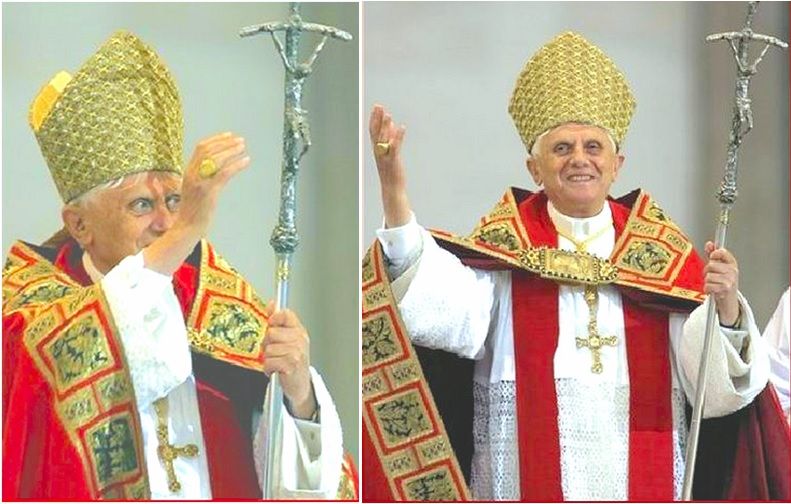 L'Osservatore Romano had a brief editorial on the Pentecost vigil, under the banner headline "LIFE, LIBERTY, UNITY, CO-RESPONSIBILITY'
L'Osservatore Romano had a brief editorial on the Pentecost vigil, under the banner headline "LIFE, LIBERTY, UNITY, CO-RESPONSIBILITY':
Benedict's majestic Magisterium
Editorial
Translated from the 6/5-6/6/2006 issue of

The Magisterium that Benedict XVI, with rigor and vigor, has been carRying out since the day he was elected to the Chair of Peter, reached one of its highest moments on the Vigil of Pentecost.
The homily at the Vespers celebration, in the presence of hundreds of thousands of representatives of church movements and new communities, will enter into the history of Pontifical teaching as one of those fundamental discourses which can never be set aside.
There are many key words which could synthesize the sense of this true and proper treatment of lay ecclesiality - (which was) a great hymn to the animating beauty of the Spirit, and at the same time, an exigent guidebook for the vocation of church movements and communities in the Church and in the world.
One of these key words certainly is the expression which the Pope used in referring to the 'feast of creation' at Pentecost: 'the garden of God.' In the variety of its colors, of its forms, of its sounds, even the extraordinary celebration on Saturday evening was, in a certain sense, an image of the ‘garden of God.’
But four words seem to us particularly expressive of the main passages of the Pope’s reflections: life, liberty, unity, co-responsibility.
It is truly from the Holy Spirit, “creative fountain of life,” that the impetuous river of the movements and communities flows from. In His school, they learn daily what “true freedom” is. In His powerful Breath, they experience that ‘unity’ which orients individual charisms to edify the one Body which the Church.
Only men and women who are alive, free and united can feel authentic ‘co-responsbility”, that is, be involved in “the same responsibility that God has for the world and for all humanity.”
It is a sublime and demanding mission. A mission for ‘sons' not 'slaves'. A mission for souls kindled with the fire of Pentecost.
What is news if this was not?
You'd think a crowd of hundreds of thousands gathered for any reason would be news, wouldn't you? Especially if the gathering was for prayer! No for some pop concert, Renato Farina, an Italian writer whose perceptive pieces about Benedict XVI we have posted in translation a number of times, writes about the Saturday Pentecost Vigil encounter of some 400,000 Catholics with their Pope at St. Peter's Square.
The theme of the encounter was THE BEAUTY OF BEING CHRISTIAN AND THE JOY OF COMMUNICATING IT. Anyone who watched the TV coverage or has seen photographs of the assembly could vouch that the participants certainly lived up to it! Farina reflects about why such an event was not considered news by most of mainstream media in Italy...:
How many divisions
has the Pope, 2006
By RENATO FARINA
Translated from

June 4, 2006
Yesterday (6/3/06) the movements and new communities were in St. Peter’s Square. The crowds stretched, under a blue sky and gusts of wind, all the way to the banks of the Tiber. But where was the news?
No one was killed, no one burned flags, there were no anti-American slogans.
The crowds were asked to come by the Pope. They prayed.
Confidentially, I can tell you I was very proud. Among the 37,000
ciellini present [representatives of Comunione e Liberazione] was my 16-year-old son. An overnight trip by bus, and the whole day under a beautiful sun, and then back to the bus and home to Brianza – two sleepless days - and to go to Rome, he spent his allowance.
I asked him why. “Dad, I am looking for happiness. I am going with my friends.”
Looking for happiness? Without breaking or bashing anything? Logical! There is no news.
The Reuters corespondent, the legendary Phil Pullella, who is always the first to be wherever the Pope sets foot, whether in Africa or Garbatella, is not pleased. “But there’s little to write about!”
There were 350,000, no - make that 400,000, but the only news to say was: there were a lot.
So there would be a few lines in the papers. This crowd deserved more, but no one would buy them!
Then, Ratzinger’s discourse was too religious to enter into the big international news circuits.
More important to them was the morning ”cordial encounter” between Benedict XVI and Tony Blair, when “positive dialog with moderate Islam” was stressed (the phrase in quotes is from the Vatican Press Office).
And yet. And yet. What injustice! It was the
New York Times which in 2003 described public opinion manifested in the public squares as “the new superpower.” But only if the crowds are dominated by red banners or rainbow flags? In such a case, the 400,000 gathered here Saturday would have been counted as a million to a million and a half by the labor unions and the nightly TV news programs!
But these 400,000 came here for the Pope, to pray even! Therefore, where’s the news?
There was news? Well, what?...
The largest demonstration on the planet yesterday took place in St. Peter’s to announce “that the only treasure, the precious pearl” has been recovered. It belongs even to you who is reading this and to any man who accepts it to the very ends of the earth. That in life, “there is something true, good and beautiful,” one can meet Him personally, it is “the person of Jesus Christ, and he is not a ghost.”
Impossible to just keep it to yourselves, boys and girls. (I write boys and girls but among the 120 movements present yesterday, there were as many white-haired persons as youths).
But I realize: This is an old story. Also: It’s a question of grace. But if one writes - the Pope said so, the quotations above become official Papal statements. It’s easy, so easy, to raise an eyebrow, and say, So what if the Pope said so?
But for once, whatever we believe or don’t believe, let’s pause awhile. Yesterday deserved news coverage. Someone like me is telling you, and I understand if you want to place a hand on my shoulder and say, Sorry pal, maybe next time, I have other things to do.
But here we have someone like Papa Ratzinger with the lightpower of some stars in the heavens! How he speaks of God, this Bavarian man, how he makes God present and living – it is a spectacle that is like the snows of Kilimanjaro or a sunset behind Mont Blanc.
It is truly a crime against reason and against the pleasure of living not to take seriously what he is saying. He does not limit himself to arguing the existence of God. He offers the possibility of another life, another freedom. The only way out of despair.
He is not prophesying the Apocalypse. This man is showing us a beautiful road towards “joy.” He says simply ”God is love.” And it overwhelms me, I am ashamed to say. The rules of journalism would dictate that one gloss over such statements.
Nevertheless! How virile is this love of God. It builds monasteries that withstand the onslaught of barbarians. Those were the Middle Ages, when men like Benedict and Francis lived.
But there is today. The Christian challenge continues. It had been given up for dead, Christianity. Stalin ridiculed it, and before him, Nietzsche.
Yesterday, the Soviet satellites launched to spy on us, still in orbit even if the USSR is long dead, were forced to see from on high the Pope’s divisions assembled in St. Peter’s Square.
On the giant screens, one could see images of the first encounter. May 31, 1998. The aging Wojtyla listening to an aging Giussani (founder of CL), who described the heart of man beseeching Christ, and the heart of God. Both are now gone, but no one here believes that...
Papa Ratzinger, in his red cloak, had earlier passed through these multicolored and festive crowds.
Then followed the testimonies, the songs. The recitation of Vespers, with the Psalms commented on by movement leaders.
Then it was his turn. The Pope. He described the heart of our times. But he also spoke – and here, there was but one page - of the “intimnacy of God”, of “the heart of God.”
Here I summarize: Quoting Wojtyla, he used the word ‘providential’ to describe “your associations and communities…above all because the sanctifying Spirit uses these to reawaken the faith in the hearts of so many Christians.”
He tackles the difficult questions: “Now we ask ourselves. Who or what is the Holy Spirit? How can we recognize Him?…The world in which we live is the work of this Creative Spirit. Pentecost is also a feast of creation. The world does not exist of itself; it comes from the Creative Spirit of God, from God’s creative Word. And because of this, it also mirrors the wisdom of God.”
In short: The beauty of creation reveals God. But what has man done with this creation?
“God’s good creation, in the course of human, history, has been covered over with a massive layer of filth…But the Creative Spirit comes to our aid. He entered history and therefore speaks to in a new way. In Jesus Christ, God himself became man and has allowed us, so to speak, to take a look at the intimacy of God himself.”
Here Ratzinger opens a mysterious page: He describes God.
“We see something completely unexpected: In God, there exists an I and a You. The mysterious and remote God is not an infinite solitude, he is an event of love. If by looking at Creation we think we are able to glimpse something of the Creative Spirit, God himself, almost like creative mathematics, a power who makes the laws of the world and imposes order, but also, as beauty, then we come to know: the Creative Spirit has a heart. And that is Love.”
These sentences are not easy to chew, but they are good for our teeth.
God sent Jesus. “Jesus did not just allow us to look at the intimacy of God. With Him, God himself emerged from His intimacy to come to us…Jesus, and through Him, God Himself, comes to us and draws us within Him.”
In short…you get what I mean. This is catechism. It won’t play in the papers. They’d rather have the catechism according to Dan Brown.
Ratzinger describes life today: “The greater majority of men today have the same concept of life as the prodigal son in the Gospels… To get from life all that it can offer. To enjoy life to the full – to live, simply to live. At the end he found himself a mere swineherd, envying those animals outright, so empty had his existence become, so in vain. Even his freedom proved to be in vain.
"
Is this not perhaps also happening today? When one only wants to take mastery of life, it becomes emptier, poorer. It is easy to end up taking refuge in drugs, in grand illusions. And the doubt arises whether living, after all is said and done, is really any good at all. No, this is not the way to find life.”
There is another possibility. I will let Don Julian Carron, Don Gius’s successor, who spoke after the Pope, synthesize it:
“It is up to Christians today to give the reasons for living, for our faith. Without imposing anything. We may be listened to or not, but no one can stop us from spreading the news that the Pope spoke of… Maybe it will take centuries to reverse the actual situation. It is a bit like Christianity was at its very beginning.”
Maybe I have bored you. But I would like you to know that in order to serve you and do my job yesterday, I gained a plenary indulgence. That, and a decided wish to live!

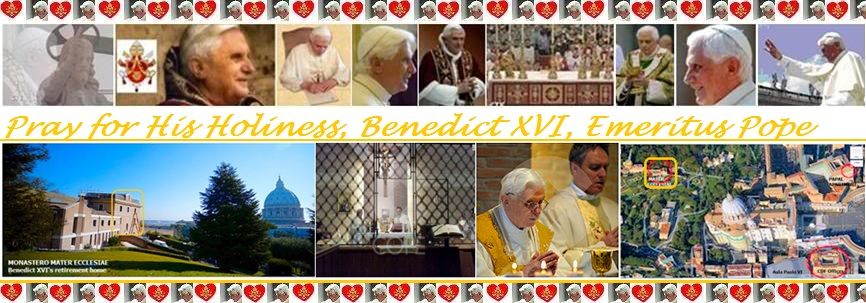
[Modificato da TERESA BENEDETTA 19/05/2013 11:35]